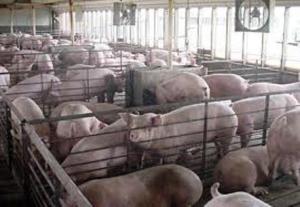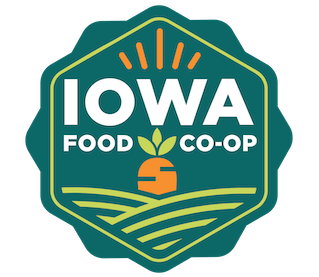We learned this week that the existence of a fellow producer and local CSA, Small Potatoes Farm, is being threatened by the proposed building of a 5000 head hog confinement operation within 1 to 2 miles of their farm by Brelsford Pork. As Small Potatoes Farm owner Rick Hartmann puts it:
Iowa both leads the nation in hog production and contaminated water. We have some of the worst levels of bacteria, nitrogen, and phosphorous pollution. Between 1992 and 2004, there were more than 450 manure spills from Concentrated Animal Feeding Operations (CAFOs) in Iowa. These spills have killed millions of fish and have jeopardized public health by contaminating surface and ground drinking water. There is also ample evidence of the destructive social and economic impacts on rural communities and family farms from CAFOs.

Pigs in Concentrated Animal Feeding Operation (CAFO)
I don’t know much about Brelsford Pork other than they build large hog confinements and the owner does not live on the facility. Brelsford Pork may be the exception to the commonly held perception of corporate farms. Maybe they are good stewards of the land and are able to control odor. Maybe they build a 10000 head facility and fill it half full to reduce crowding. Maybe they provide cheap food to people who otherwise would go hungry. I don’t know much about Belsford or their practices.
What I do know is that corporate farms exist because they take advantage of economies of scale and, it seems to me, are driven by a passion for profits. Environmental stewardship is too often treated as merely a cost of production. Most local producers like Small Potatoes, on the other hand, appear to be driven by a passion for environmental stewardship where profits, unfortunately, are a cost of production.
In the livestock business economies of scale are generally achieved by spreading costs over larger and larger livestock outputs (i.e. more animals units produced per square foot/man hours/month). Accomplishing these increased outputs can sometimes lead to negative environmental impacts like the ones described by Rick. And sometimes accomplishing these increased outputs can lead to another type of environmental impact… the loss of local producers!
We also learned a few days ago that a fellow local producer, Iowa Farm Families, is closing it’s doors. Iowa Farm Families produces phenomenal hormone free, gluten free, and antibiotic free pork products.
We are a small group of Iowa farm families determined to remain independent pork producers. We are dedicated to producing the best pork you can buy. The owners of our company have combined their talents to naturally select animals that consistently have ideal meat PH values and instramuscular fat levels. The result is pork that is consistently tender, with more internal marbling and moisture than commodity pork.

Little piggies on a family farm.
According to a spokesperson, Iowa Farm Families’ can no longer compete in today’s economy. Once supported by 47 pork producing farm families, Iowa Farm Families now struggles to provide its quality pork product from 4 pork producing farm families. Is it coincidence that the downward trend of Iowa pork producing farm families is inversely proportional to the increasing trend of CAFO’s?
Just as we must all do our part to preserve fragile environment, we must all do our part to keep our fragial local farms alive. Do your part by supporting our markets and cooperatives that offer local products.
For more information on the Small Potatoes Farm “Call to Action” initiative, contact farmer Stacy Hartmann at 515-677-2438. As for Iowa Farm Families, we may be too late. But next time you have the opportunity to buy quality local pork… don’t complain about the price!


